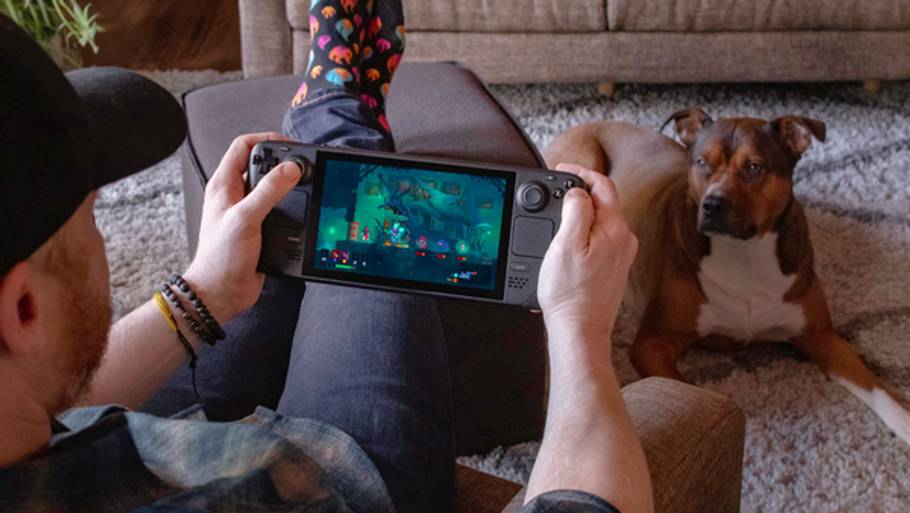Meet the budget handheld PCs set to undercut Valve’s $399 Steam Deck
The Steam Deck is still a hot commodity right now, with its $399 (£349, around AU$560) base price tag making it a very attractive prospect to gamers on the go. With the massive success of the Nintendo Switch, Valve’s handheld provides a portable option for PC gamers, but competition is surging across the market.
Still, the Steam Deck has managed to establish itself as the go-to choice for handheld PC gaming, largely in part to its lower price. Serious competitors, like the OneXPlayer Mini and the AyaNeo Next Advance, offer decent performance but come with a price in excess of a thousand dollars for the base unit.
Cheaper Competition
However, AyaNeo has a new handheld PC in the works, named the AyaNeo Air Plus. A budget competitor to AyaNeo’s burgeoning range of Steam Deck imitators, the Air Plus is billed as the first handheld to run on AMD’s new Ryzen ‘Mendocino’ APUs. This chip runs on AMD’s Zen 2 architecture, with Radeon RDNA 2 graphics and a custom Linux-based OS designed by AyaNeo.
Other technical specs for the Air Plus are thin on the ground right now, but we do know that the unit will use a smaller 6-inch OLED screen than previous AyaNeo handhelds and the Steam Deck, which both rock a 7-inch display. The Air Plus uses a 1080p screen, however, a slightly higher resolution than the Steam Deck’s 1280 x 800.
The Air Plus will also use an M.2 2280 SSD for storage (in addition to a microSD card slot), a step up from the eMMC drive found in the cheapest version of the Steam Deck. This is assumed to be removable for easy upgrading, and should provide speedy load times in games.
AyaNeo is pricing the base model of the Air Plus at just $289 (£230, around AU$400), making it significantly cheaper than the Steam Deck (though still more expensive than the $200 (£200, AU$330) Switch Lite). It’s unclear at this point what different models may be available, or what the other hardware specs will entail.
Chinese manufacturer AYN also has a budget Steam Deck competitor in the works, expanding on its Android-powered Odin line with the Loki series, which will run a full x86 OS. There are multiple Loki handhelds on the way, starting with the $299 Loki Mini while the top-end Loki Max will run a steep $799.
All Loki models will be running a 6-inch 1080p screen like the AyaNeo Air Plus, although this display is an IPS LCD panel rather than an OLED. Unlike the Air Plus, the specs for the Loki and its variants (no, there isn’t one called the Sylvie) are available on AYN’s website.
The spec list for the most affordable model includes a user-upgradable 128GB M.2 2230 drive, a choice between an Intel Celeron or AMD Mendocino processor, 8GB of RAM, Wi-Fi 6E and Bluetooth 5.2. The Loki Max boasts a 512GB SSD and a Ryzen 7 processor backed up by 16GB of DDR5 memory.
AYN was overwhelmed with pre-orders following the successful crowdfunding of the Odin, and still hasn’t managed to fulfill every order, but has demonstrated good transparency about when customers can expect to receive their hardware. Pre-orders for the Loki are already available, with the product expected to ship in Q4 of 2022.
Analysis: What does this mean for the Steam Deck?

With actual competitors approaching in the same price range, Valve might need to adapt its approach to Steam Deck marketing in order to remain relevant in the handheld hardware sphere. Cheaper Steam Deck models likely won’t be forthcoming, but the real question will be how AYN and AyaNeo’s wallet-friendly alternatives can offer in terms of performance.
Still, with SteamOS as an option for both the AYN Loki and the AyaNeo Air Plus, it’s hard to see how Valve won’t still come out winning. Even if the Steam Deck proves too expensive for some, every handheld PC sold by any manufacturer is another potential customer for the Steam platform.
Valve has abandoned hardware efforts before; remember the ill-fated Steam Machines, Valve’s attempt to merge PCs and home consoles? If the wider handheld market looks to grow beyond Valve’s reach, it wouldn’t be surprising to see the Steam Deck take a backseat as the company focuses on making its ever-expanding game library playable on portable PCs.
Via PC World
Post a Comment for "Meet the budget handheld PCs set to undercut Valve’s $399 Steam Deck"